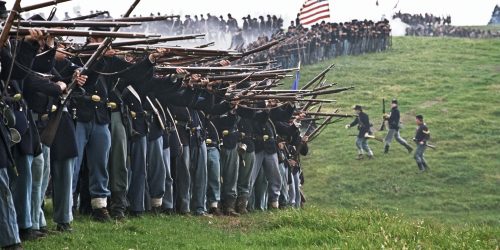
God answered his prayer. Henry survived, returned to Illinois, and worked as a tax collector. But his journey of faith was just beginning.
He fought for nearly three years until being mustered out on June 10, 1865.1
One battle during the American Civil War, however, changed his life forever. At Chickamauga, the bloodiest battle in the Western Theater, Henry was wounded in the “left breast and arm” and lay on the battlefield for ten agonizing days before being captured by Confederate forces. During this time of intense suffering, he made a solemn promise: “If [God] would spare his life, he would serve Him the rest of his days.”
God answered his prayer. Henry survived, returned to Illinois, and worked as a tax collector. But his journey of faith was just beginning.
Around 1874, Seventh-day Adventist ministers C. L. Boyd and A. J. Cudney arrived in Stromsburg, Nebraska, preaching the Sabbath message. A devoted Lutheran, Henry was urged by his pastor to refute them. Determined, he studied the Bible—but what he found shook him.
“Brother Schultz took his Bible, and after studying for a week or more, was so overcome with the absence of authority for Sunday sacredness that he threw his Bible down and buried his face in his hands. His good wife said to him, ‘What is the matter?’ He said, ‘If we are going to go by the Bible, we shall have to keep Saturday, for there is not a word in it about Sunday.’ ‘Well,’ said she, ‘I want to go to heaven, so I’ll obey the Lord.’”
That day, Henry and his wife, Sarah, chose to follow God’s Word. They soon joined the Adventist Church, where Henry became an elder.
One year later, Henry attended an Adventist camp meeting in Iowa, where he received a license to preach. His wife, Sarah, managed the farm and family with tireless devotion, known for her kindness and generosity. On Sept. 24, 1878, Henry was ordained at a camp meeting in Seward, Nebraska. He preached among English-speaking communities for seven years and, by 1882, had become president of the Nebraska Conference.
As German immigrants poured into America, Adventist leaders saw a growing need for ministry. Though Henry had been born in Germany, he had left at age 9 and barely remembered the language. Through dedicated study, he regained fluency and began preaching in German, organizing a church in Columbus, Nebraska.
For over 50 years, Henry Schultz served the Adventist Church as a pastor, evangelist, and administrator. He spent two decades leading the work among German-speaking believers. Even in retirement, he continued planting churches and sharing the gospel.
Henry and Sarah Schultz left a legacy of unwavering faith. From the battlefields of war to the front lines of evangelism, Henry kept his promise to God—a promise that still inspires us today.
References
Denis Kaiser is an associate professor of church history at the Seventh-day Adventist Theological Seminary at Andrews University.